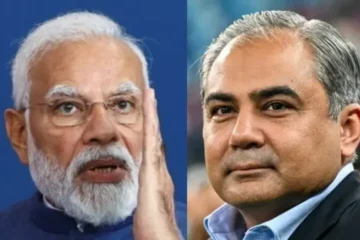The Kingdom of Saudi Arabia has announced that a prominent street in the capital city of Riyadh will be renamed to honor the late Sheikh Abdulaziz Al-Asheikh, the country’s former Grand Mufti, who passed away on September 23, 2025. This decision, directed by Crown Prince Mohammed bin Salman, symbolizes the deep respect the Kingdom holds for one of its most influential religious scholars of the modern era.
A Tribute to a Lifetime of Service:
Sheikh Abdulaziz Al-Asheikh devoted his entire life to serving Islam, guiding generations of Muslims, and shaping Saudi Arabia’s religious identity. For more than two decades, he held the esteemed position of Grand Mufti, the highest religious authority in the Kingdom. His role placed him at the heart of Islamic scholarship, Shariah law interpretation, and fatwas issuance on complex social, legal, and financial issues.
Renaming a street in his honor is more than just a symbolic gesture; it is a recognition of his profound impact on Saudi society, Islamic jurisprudence, and the wider Muslim world. Streets named after national and religious figures in Riyadh are reserved for individuals whose legacies have shaped the Kingdom’s cultural and historical narrative. Sheikh Abdulaziz’s name now joins that honored list.
The Life and Legacy of Sheikh Abdulaziz Al-Asheikh:
Born into a family of scholars, Sheikh Abdulaziz grew up deeply immersed in Islamic teachings. His passion for knowledge and dedication to religious studies led him to rise through the ranks of Saudi Arabia’s scholarly institutions. By June 1999, he was appointed Grand Mufti, succeeding Sheikh Abdulaziz bin Baz, another towering figure in the Kingdom’s religious history.
Over his 26-year tenure as Grand Mufti, Sheikh Abdulaziz became a guiding voice not only for Saudis but also for millions of Muslims across the globe. His leadership helped align traditional Islamic scholarship with a rapidly modern society’s evolving realities. While firmly grounded in classical jurisprudence, his fatwas often addressed new challenges brought by globalization, financial systems, and technological change.
Contributions to Islamic Jurisprudence:
As Grand Mufti, Sheikh Abdulaziz was responsible for interpreting Shariah and providing guidance on matters ranging from personal conduct and family law to business ethics and international finance. His rulings were widely respected for balancing authenticity with practicality, ensuring that the principles of Islam remained relevant to contemporary issues.
He issued fatwas on banking, insurance, medical ethics, and digital technologies, carefully navigating the fine line between tradition and modernity. Under his leadership, Saudi Arabia’s religious establishment provided a framework for Muslims to engage with the modern world while remaining faithful to Islamic values.
Leadership Roles and Global Influence
In addition to serving as Grand Mufti, Sheikh Abdulaziz held other influential positions, including:
- Chairman of the Council of Senior Scholars – the highest religious authority in Saudi Arabia.
- President of the General Presidency of Scholarly Research and Ifta – overseeing the issuance of fatwas across the Kingdom.
- Chair of the Muslim World League’s Supreme Council – strengthening ties with Muslim communities worldwide.
Through these roles, Sheikh Abdulaziz became an international representative of Saudi Arabia’s religious thought. He participated in global conferences, addressed issues facing the Muslim Ummah, and worked to bridge differences within Islamic communities. His words carried weight not only in Riyadh but also in Muslim-majority nations from Asia to Africa.
Recognition by Crown Prince Mohammed bin Salman:
Crown Prince Mohammed bin Salman’s decision to rename a street after Sheikh Abdulaziz reflects the Kingdom’s commitment to preserving the legacies of scholars who shaped its spiritual and intellectual identity. In an official statement, the Saudi Press Agency noted that the directive acknowledges the Sheikh’s “scholarly status, his contributions to Saudi Arabia, and his service to Islam and the wider Muslim community.”
By commemorating his life in this way, Saudi Arabia ensures that future generations remember Sheikh Abdulaziz not only as a scholar but also as a leader who guided the nation through critical times of transformation.
An Era of Religious Evolution in Saudi Arabia:
The passing of Sheikh Abdulaziz marks the end of an era in Saudi Arabia’s religious establishment. His tenure coincided with a period of great change for the Kingdom—socially, politically, and economically. As Saudi Arabia pursued modernization and economic diversification under Vision 2030, the role of religious scholars became increasingly important in shaping public discourse and maintaining harmony between faith and development.
Sheikh Abdulaziz’s fatwas often addressed the concerns of a society balancing tradition with progress. Whether on matters of finance, medical ethics, or family law, his rulings were known for their depth of knowledge and careful consideration of context. For many, his leadership exemplified the ability of Islamic jurisprudence to adapt while staying true to its principles.
The Significance of Honoring Religious Scholars
In Islamic tradition, scholars are highly respected as inheritors of prophetic knowledge. Honoring them by naming streets, mosques, or institutions after them serves as a reminder of their role in guiding society. By renaming a street in Riyadh, the Kingdom is not only memorializing Sheikh Abdulaziz but also reinforcing the central role of scholars in shaping national and religious identity.
This decision also reflects the Kingdom’s broader vision of preserving its heritage while acknowledging the contributions of individuals who played pivotal roles in its development.
Reaction from the Muslim Community
News of Sheikh Abdulaziz’s passing and the subsequent honor of renaming a Riyadh street in his name has been met with widespread respect across the Muslim world. Scholars, community leaders, and ordinary Muslims have expressed gratitude for his lifelong dedication to Islamic teachings. His legacy is seen as one that transcends borders, with many viewing him as a unifying figure in a time of challenges for the global Muslim community.



1 Comment
8okwin · January 26, 2026 at 7:14 am
Alright, 8okwin, show me what you got! Giving it a shot tonight. Wish me luck, folks! 8okwin